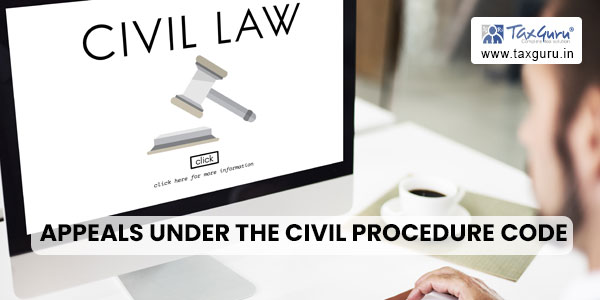This article provides an in-depth analysis of Part VII of the Civil Procedure Code (CPC) in India, focusing on appeals under civil cases. It explores the general grounds of appeal, the types of appeals available, the limitation periods for filing appeals, and the eligibility criteria for filing an appeal. Understanding the provisions and procedures related to appeals is crucial for those involved in civil cases in India.
Grounds of Appeal
Appeals under the CPC can be made based on the following unique grounds:
i. Pre-existing Decision: An appeal can be filed when a judicial or administrative authority has already made a decision.
ii. Grievance of the Person: The appellant must be aggrieved by the aforementioned decision, regardless of whether they were a party to the original proceeding or not.
iii. Entertained Appeal: The appeal must be entertained by a reviewing body.
Types of Appeals
1. Appeal from Original Decrees: Under Section 96 of the CPC, an appeal can be filed based on any decree passed by a court exercising original jurisdiction. The appeal is heard by the Court of Appeal authorized to review the original court’s decision. However, there is an exception where no appeal lies from an appellate decree passed by the Judge with the consensus of the parties. Nevertheless, an appeal can be pursued for original decrees passed ex parte, i.e., without the parties’ hearing. If the subject-matter’s sum does not exceed Rs. 10,000, an appeal lies only on questions of law against the decree passed by the small court of cause. Generally, an appeal can be initiated by an adversely affected party or its representatives acting in the interest of the appellant.

2. Second Appeal: As per Section 100 of the CPC, a second appeal can be filed in the High Court from every decree passed in appeal by any subordinate court if it involves a substantial question of law. This type of appeal can also be filed against an appellate decree passed ex parte. The appellant must precisely state the substantial question of law in the memorandum of appeal, and the High Court, if satisfied, shall formulate the question. However, the respondent retains the right to argue that the question formulated by the court does not constitute a substantial question of law. Notably, second appeals cannot be filed for a decree if the subject matter of the original suit intended to recover a sum of Rs. 25,000 or less, as per Section 102.
Limitation Period for Appeals
While the Code of Civil Procedure does not explicitly prescribe a limitation period for filing appeals, the Limitation Act of 1963 specifies the timeframes. According to this act, an appeal against a decree or order must be brought before the High Court within ninety days and before any other court within thirty days from the date of the appeal against the decree or order.
Appeals to the Supreme Court
General appeals to the Supreme Court are governed by Articles 132, 133, and 134A of the Constitution of India concerning civil matters. An appeal can be filed in the Supreme Court if the High Court certifies that the case involves a substantial question of law of general importance and opines that the said question needs to be decided by the Supreme Court.
Eligibility for Filing an Appeal
The following individuals are eligible to file an appeal:
i. Parties to the Original Proceeding: Any party involved in the original proceeding or their legal representatives can file an appeal.
ii. Claimants or Transferees: Individuals claiming under a party to the original proceeding or those who have acquired an interest in the subject matter can file an appeal.
iii. Legal Guardian: A person appointed by the court as the legal guardian of a minor can file an appeal.
iv. Other Aggrieved Persons: After obtaining leave from the court, any other person who is aggrieved can file an appeal.
Who Cannot File an Appeal?
Certain parties are barred from filing an appeal under specific circumstances:
i. Relinquished Right of Appeal: A party that has relinquished its right of appeal through a clear and unambiguous agreement.
ii. Benefits Already Availed: A party that has already availed the benefits under a decree.
iii. Consent Decree Parties: Parties involved in a consent decree, where the consent could be a lawful agreement, compromise, or presumed from the parties’ conduct.
iv. Disputed or Unformulated Factum or Compromise: Parties whose factum or compromise is in dispute or has not been formulated.
v. Petty Cases: Parties involved in petty cases.
vi. Legal Representatives of a Deceased Person: Legal representatives are not entitled to file an appeal against a deceased person.
Conclusion: Understanding the provisions of appeals under civil cases in India is vital for individuals involved in legal proceedings. Part VII of the Civil Procedure Code (CPC) provides the framework for appeals, including the grounds, types, and limitations. By familiarizing themselves with the CPC’s guidelines, individuals can navigate the appeals process effectively and seek the appropriate remedies in civil cases.





